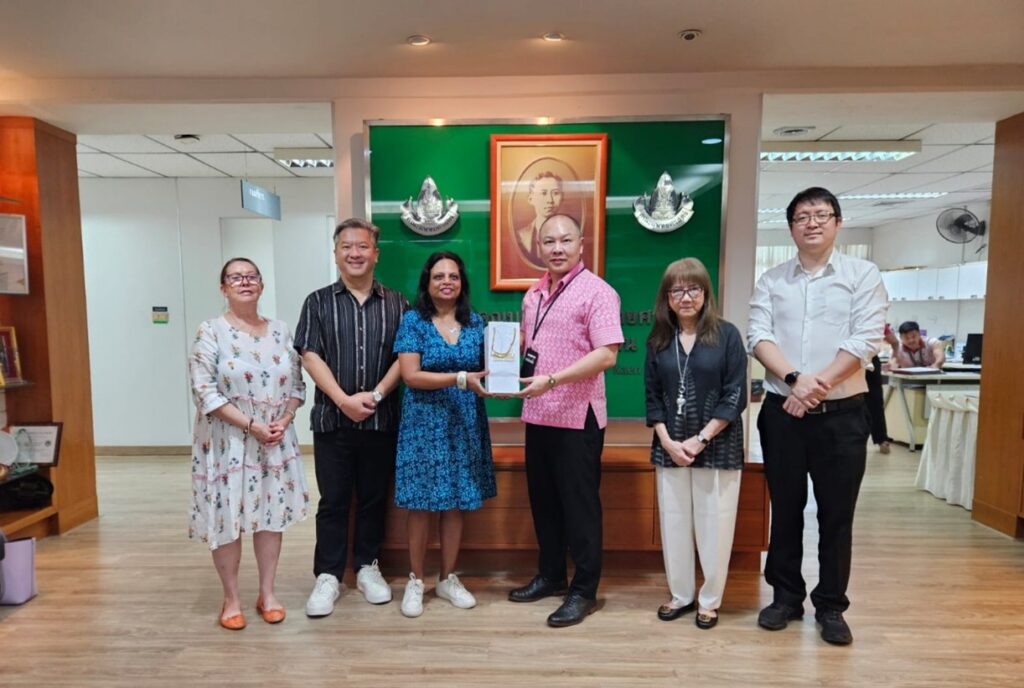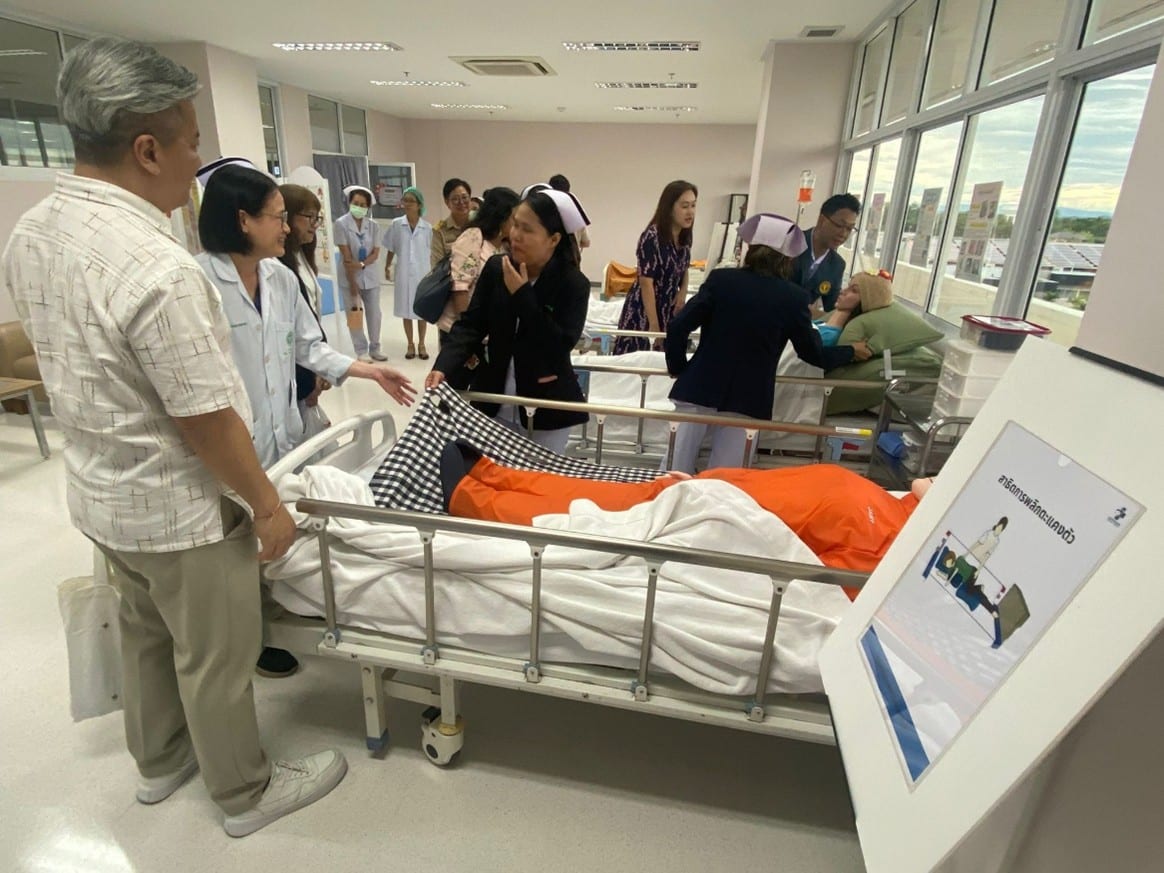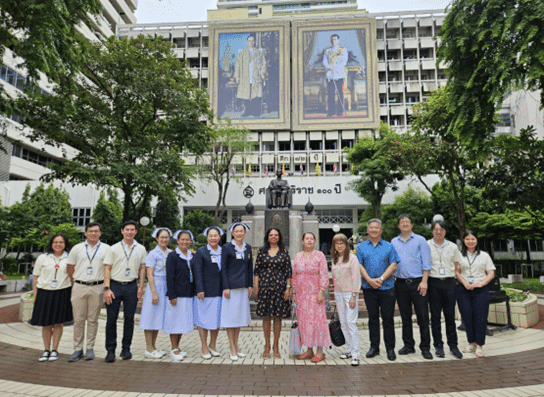From 21–25 July 2025, the Asia Pacific Hospice Palliative Care Network (APHN) delegation, led by A/Prof Ghauri Aggarwal, Dr Jan Maree Davis and Mr Giam Cheong Leong, with support of Dr Srivieng Pairojkul and Dr Attakorn Raksasataya visited Thailand to observe developments in palliative care and strengthen collaborations in education, training, research, and fellowship.

Government Commitment and Integration
Thailand, with its Universal Health Coverage system, has firmly embedded palliative care into essential services. The Ministry of Public Health (MoPH) mandates palliative care in all hospitals, alongside advance care planning under the National Health Act. Ranked at Level 4a (“Preliminary Integration”) on WHO’s global mapping, Thailand has made notable strides, though challenges remain in paediatric care and equitable access in rural settings.
Insights from Site Visits Across Thailand
The APHN delegation visited a range of institutions in Khon Kaen, Udon Thani, and Bangkok, each demonstrating unique strengths in palliative care.
Namphong District Hospital showcased a community-based approach where Village Health Volunteers are central to rural service delivery, while Udon Thani Regional Hospital impressed with hospital-wide screening, CME training, and partnerships with Buddhist monks to extend care into the community. At the Udon Thani Cancer Hospital, advanced cancer pain management and comprehensive opioid access were complemented by adjunctive therapies such as art, music, meditation, and pet therapy, creating a holistic healing environment.
In Khon Kaen, the Regional Hospital highlighted the integration of palliative care into medical and nursing education, while Karunruk Hospice offered a distinctive model blending Buddhist spiritual traditions with family-centered care.
In Bangkok, Siriraj Hospital, Thailand’s flagship teaching hospital, set the benchmark for postgraduate training, curriculum development, and bereavement services. Meanwhile, Sirindhorn Hospital underscored the importance of integrating palliative care into geriatrics and chronic disease services, reflecting the needs of an aging society.
Together, these visits illustrated Thailand’s diverse and evolving palliative care landscape, where academic excellence, cultural traditions, and community engagement combine to deliver compassionate care.

Key Learnings
The visit highlighted several strengths in Thailand’s palliative care landscape. Strong government ownership is evident through the National Palliative Care Strategy, which mandates services across the country.
Education is well integrated, with palliative care embedded at both undergraduate and postgraduate levels and fellowships established at Siriraj, Chiang Mai, and Khon Kaen Universities. Community empowerment remains a cornerstone, with Village Health Volunteers, temple-based care, and NGOs driving grassroots engagement. Access to essential medicines such as opioids is robust at tertiary and regional hospitals, though gaps remain at the community level. Thailand also demonstrates leadership in research, contributing through annual conferences and international collaborations.
Importantly, the legacy of APHN training is clearly visible, as alumni of the APHN–Flinders course (2006–2007)—including Dr Pairojkul, Chair of the Thai Palliative Care Society, and Dr Sakon Singha, Chair of the PC Unit at Songklanagarind Hospital—now hold national leadership roles, underscoring the long-term value of APHN’s investment in building capacity and nurturing future leaders.
Looking ahead
The visit highlighted several important priorities for APHN’s collaboration with Thailand.
Education and advocacy remain at the forefront, with plans to organise specialty workshops led by international experts, particularly in areas such as symptom management, policy development, and community-based models of care. A strong emphasis will also be placed on developing paediatric palliative care, an area still under-served nationally. Fellowship and observership programmes will be expanded, encouraging Thai doctors and nurses to apply for the Cynthia Goh Palliative Care Fellowship and to participate in exchange opportunities across leading institutions such as Siriraj Hospital and Karunruk Hospice.
Research collaboration is another priority, with opportunities to link the Khon Kaen Research Centre, the Duke-NUS Lien Centre for Palliative Care, and the APHN Research Committee to address key topics including opioid accessibility, paediatrics, and culturally appropriate models of community care.
Thailand is also well-positioned to host the future Asia Pacific Hospice Palliative Care Conference (APHC), a milestone that could galvanize further investment and national momentum for palliative care.

A Shared Journey Forward
This visit reaffirmed Thailand’s emergence as a regional leader in palliative care. The continuity from seeds planted nearly two decades ago through APHN training to today’s national leadership is a powerful reminder of the lasting impact of investment in education and fellowship.
APHN looks forward to deepening its partnership with Thailand—expanding training, strengthening research, and building a sustainable network that will benefit patients and families across Asia Pacific.
Written by Mr Giam Cheong Leong (APHN Executive Director )
This project is a Lien Collaborative for Palliative Care initiative to build capacity in developing countries in Asia. The Lien Collaborative for Palliative Care was co-developed by the Asia Pacific Hospice Palliative Care Network (APHN) and the Lien Foundation.
